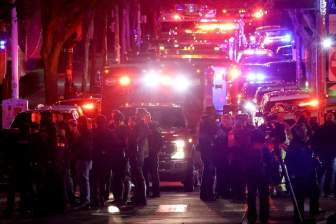It’s a time of year that’s focused around gathering and celebrating with family and friends, but for many, the holidays are a time filled with stress, loneliness and anxiety.

Mental health experts say that’s particularly the case this year.
“People are feeling very lonely and isolated panicking because of the cost of things,” said Tara Snider of Sara Riel Mental Health and Addictions services.
“And they need to talk to somebody anonymously.”
She says their 24-hour warm line has been busier than ever, fielding more than 40,000 calls since the start of the pandemic.
Carolyn Klassen, a therapist with Conexus Counselling, says anxiety and stress are usually magnified during the holidays, something she sees with her clients.
“In December, when you hear in the mall, ‘It’s a holly jolly Christmas, it’s the best time of the year,’ and you’re not feeling it, the contrast is even bigger,” Klassen said.

Get daily National news
“And then people struggle with, ‘Oh, I should be feeling happy and instead I feel sad or depressed or anxious.'”
Klassen says soaring inflation and financial stress, isolation, anxiety around gathering again, negative experiences with past Christmases, and even the lack of daylight can all play a role. She also says this year may be more difficult than the past two years.
- Winter storms, rain and snow wallopping Canada. Here’s where you’ll see it
- ‘A normal thing now’: Canadian family says extortion gang is preying on them
- ‘Really challenging issue’: Many B.C. communities still at high risk for flooding
- Cold warnings across the Prairies forecast wind-chill temperatures near -45 C
“This is a hard time of year and Christmas 2022 is hard because it’s the first Christmas where we don’t have restrictions in the last couple of years,” she said.
Dr. Rehman Abdulrehman, the clinical director with Clinic Psychology Manitoba, says the expectations and pressures related to the holidays can often be overwhelming.
“As a society we place a lot of pressure and expectations we have on people,” Abdulrehman told Global News, adding that those expectations often show up in gender, sexuality, cultural or religious norms.
“Even if we are from the dominant culture, there’s this Norman Rockwell Christmas expectation and no matter how far we’ve advanced in society in terms of trying to help people see outside the box, Christmas has very much remained the same. We still have this 1950s ideal about what that means.”
Abdulrehman says that’s something he’d like to see change.
“We need to work as a society to change expectations,” he added. “Whether that’s tied to gender, sexuality, culture, religion, ethnicity, we really need to work on that.”








Comments